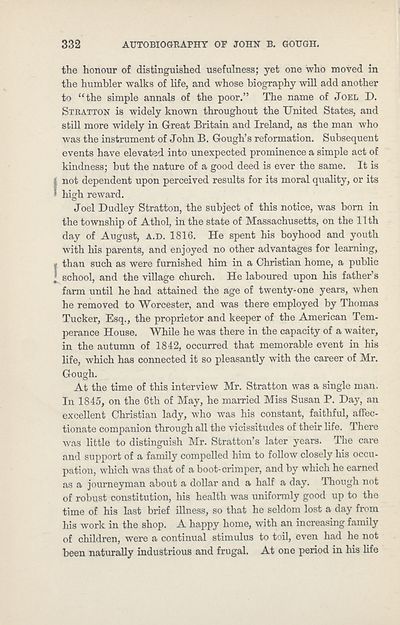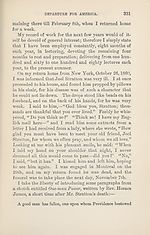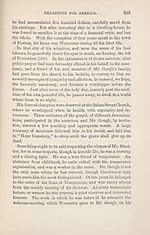Download files
Complete book:
Individual page:
Thumbnail gallery: Grid view | List view

332
AUTOBIOGRAPHY OF JOHN B. GOUGH.
the honour of distinguished usefulness; yet one who moved in
the humbler walks of life, and whose biography will add another
to “the simple annals of the poor.” The name of Joel D.
Stratton is widely known throughout the United States, and
still more widely in Great Britain and Ireland, as the man who
was the instrument of John B. Gough’s reformation. Subsequent
events have elevated into unexpected prominence a simple act of
kindness; but the nature of a good deed is ever the same. It is
(not dependent upon perceived results for its moral quality, or its
high reward.
Joel Dudley Stratton, the subject of this notice, was bom in
the township of Athol, in the state of Massachusetts, on the 11th
day of August, A.D. 1816. He spent his boyhood and youth
with his parents, and enjoyed no other advantages for learning,
< than such as were furnished him in a Christian home, a public
| school, and the village church. He laboured upon his father’s
farm until he had attained the age of twenty-one years, when
he removed to Worcester, and was there employed by Thomas
Tucker, Esq., the proprietor and keeper of the American Tem¬
perance House. While he was there in the capacity of a waiter,
in the autumn of 1842, occurred that memorable event in his
life, which has connected it so pleasantly with the career of Mr.
Gough.
At the time of this interview Mr. Stratton was a single man.
In 1845, on the 6th of May, he married Miss Susan P. Day, an
excellent Christian lady, who was his constant, faithful, affec¬
tionate companion through all the vicissitudes of their life. There
was little to distinguish Mr. Stratton’s later years. The care
and support of a family compelled him to follow closely his occu¬
pation, which was that of a boot-crimper, and by which he earned
as a journeyman about a dollar and a half a day. Though not
of robust constitution, his health was uniformly good up to the
time of his last brief illness, so that he seldom lost a day from
his work in the shop. A happy home, with an increasing family
of children, were a continual stimulus to toil, even had he not
been naturally industrious and frugal. At one period in his life
AUTOBIOGRAPHY OF JOHN B. GOUGH.
the honour of distinguished usefulness; yet one who moved in
the humbler walks of life, and whose biography will add another
to “the simple annals of the poor.” The name of Joel D.
Stratton is widely known throughout the United States, and
still more widely in Great Britain and Ireland, as the man who
was the instrument of John B. Gough’s reformation. Subsequent
events have elevated into unexpected prominence a simple act of
kindness; but the nature of a good deed is ever the same. It is
(not dependent upon perceived results for its moral quality, or its
high reward.
Joel Dudley Stratton, the subject of this notice, was bom in
the township of Athol, in the state of Massachusetts, on the 11th
day of August, A.D. 1816. He spent his boyhood and youth
with his parents, and enjoyed no other advantages for learning,
< than such as were furnished him in a Christian home, a public
| school, and the village church. He laboured upon his father’s
farm until he had attained the age of twenty-one years, when
he removed to Worcester, and was there employed by Thomas
Tucker, Esq., the proprietor and keeper of the American Tem¬
perance House. While he was there in the capacity of a waiter,
in the autumn of 1842, occurred that memorable event in his
life, which has connected it so pleasantly with the career of Mr.
Gough.
At the time of this interview Mr. Stratton was a single man.
In 1845, on the 6th of May, he married Miss Susan P. Day, an
excellent Christian lady, who was his constant, faithful, affec¬
tionate companion through all the vicissitudes of their life. There
was little to distinguish Mr. Stratton’s later years. The care
and support of a family compelled him to follow closely his occu¬
pation, which was that of a boot-crimper, and by which he earned
as a journeyman about a dollar and a half a day. Though not
of robust constitution, his health was uniformly good up to the
time of his last brief illness, so that he seldom lost a day from
his work in the shop. A happy home, with an increasing family
of children, were a continual stimulus to toil, even had he not
been naturally industrious and frugal. At one period in his life
Set display mode to:
![]() Universal Viewer |
Universal Viewer | ![]() Mirador |
Large image | Transcription
Mirador |
Large image | Transcription
| Antiquarian books of Scotland > Temperance > Autobiography and personal recollections of John B. Gough > (344) |
|---|
| Permanent URL | https://digital.nls.uk/125991497 |
|---|
| Description | Thousands of printed books from the Antiquarian Books of Scotland collection which dates from 1641 to the 1980s. The collection consists of 14,800 books which were published in Scotland or have a Scottish connection, e.g. through the author, printer or owner. Subjects covered include sport, education, diseases, adventure, occupations, Jacobites, politics and religion. Among the 29 languages represented are English, Gaelic, Italian, French, Russian and Swedish. |
|---|

